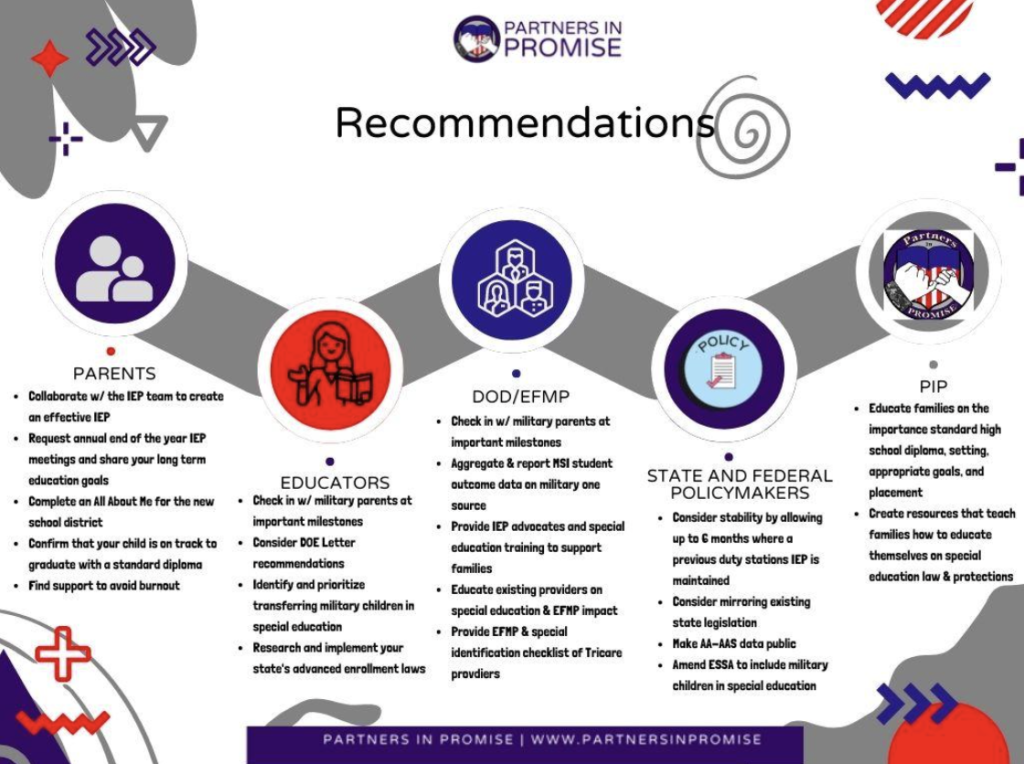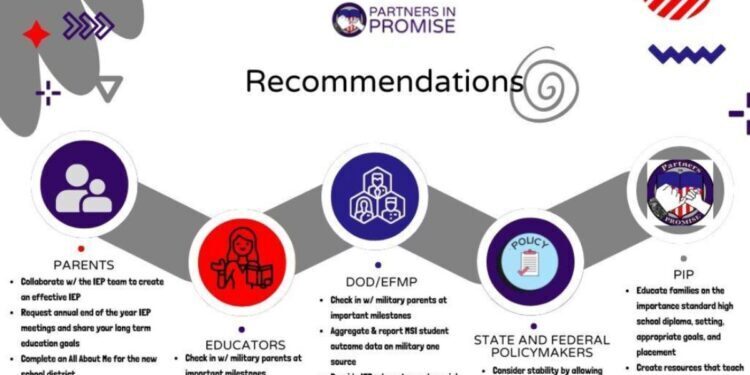By Destiny Huff
“Military parents may be the only educational constant in their child’s lives. The goals they proactively set will set their children on a path for success in later life. And the data show that. However, it also shows that this pressure is causing stress. However, this stress does not prevent military families from wanting to continue to serve. Many cited the benefits provided by the military as a primary reason their family chooses to serve.”-Jennifer Barnhill, Partners in Promise COO & Lead Researcher
The special education process can be stressful for military families. There are very few constants in the service member, spouses and children’s lives due to the sacrifice required to serve one’s country. The main constant in a military-connected child’s life is their parents. Parents advocate for their child’s physical and mental health and education. Children who receive special education services are often in need of even more advocating on their behalf than others.
As a military special education mother myself, I have become very aware that every state is different. Not just the services they have available and provide but even the IEP [Individualized Education Program] document itself. It makes the PCS process even more stressful because now it’s not just making sure my child is enrolled but making sure they understand the ins and outs of his IEP and have him enrolled correctly to receive the services he deserves. I am his advocate. But parents like me need advocates, enter Partners in PROMISE.
PARTNERS IN PROMISE & PREVIOUS SURVEYS
Partners in PROMISE was founded by four military spouses, who were also special education moms. They wanted to better understand military students in special education in order to create recommendations for educators and leaders who can help change the way military-connected children in special education are treated and served.
In 2020 and 2021 PIP conducted surveys that established several baseline measures showing how the highly mobile military lifestyle impacts their ability to receive a free and appropriate public education (FAPE) as guaranteed by the Individuals with Disabilities Education Act (IDEA). Many military families reported feeling they could not access legal resources due to the highly mobile nature of the military lifestyle. Partners in PROMISE survey data showed that military families have difficulty accessing IDEA protections when they move from one state to another.
2022 Annual Survey

So little is known about the lived experiences of military students receiving these IEP services so, Partners in PROMISE’s 2022 survey examined the existence of long-term educational outcome goals, the role of IEPs in delivering a FAPE, participation in standardized testing and being on track to receive a standard high school diploma. PIP also wanted to know if military parents believe their child’s annual IEP goals are an effective vehicle to achieve their long-term educational outcome goals. Do they have long-term educational goals for their children? Are military special education students participating in standardized testing? If so, how is this captured by the states?
Key Findings
The survey found that 35.59% of families who received services under a 504 Plan noted that their child’s school didn’t recognize the educational impact of their child’s diagnosis or only partially recognized the impact. Families also reported experiencing delays in establishing an IEP with new school districts.
Families also identified that IEP goals may not adequately support military students’ long-term educational goals. The number one goal families cited for their children was to “live independently with meaningful employment after graduation”. As a military special education mother myself I know how important it is for my child to meet his goals. If he is not on the right track to eventually receive his high school diploma, which I know he is capable of receiving with educational goal support, then he will be at a disadvantage in accomplishing all the goals he knows and we know he is capable of achieving.
Partners in PROMISE found that although over 60% of military children aged eight and older reported participating in state-wide standardized testing, this number was lower than the state participation rate and the federal alternate assessment. The official guidance tells us that only 1% should be tested under “alternate assessments”.
Luckily almost 80% of survey participants indicated their child with the highest level of need was on track to receive a standard high school diploma.
Partners in PROMISE’s final finding was that military families are stressed. The special education process is complex and requires a lot of time and energy to navigate. But it is not only special education that causes stress. The military’s Exceptional Family Member Program (EFMP) also was a source of stress with 64% saying EFMP caused stress.

Other facts reported in the survey included:
- Parents are the first to identify their child’s disability or diagnosis
- The average time a military child waits from identification of an issue to receiving special education services is 23.83 months
- 24.2% of families reported spending over 20 hours assisting in their child’s education and medical needs
“My biggest takeaway is that we do not have enough data to show how our exceptional military children are performing,” said Michelle Norman, Executive Director and founder of Partners in PROMISE. “As a community, we need to work together in collecting and aggregating data, prioritizing testing, training staff, and adding protections and support so that these students can transition from high school to higher education, vocational or college, or the workforce.”
What You Can Do?
There is a lot that military special education parents CAN do to help set their child up for success. Partners in PROMISE’s survey also includes the following tips for parents:
- Research how to strengthen your IEP/504 Plans
- Ask educators about your child’s standardized testing participation before 3rd grade & diploma status around the time they head to middle school
- Stress is real – ask for help from official and unofficial support networks

Destiny Huff, MS, LPC is an Army spouse and mother of two. Destiny is a guest blogger and volunteer with Partners in PROMISE, a nonprofit dedicated to “Protecting the Rights of Military children In Special Education.” She is a Licensed Professional Counselor who works with children, adolescents and adults through individual and/or family therapy. As well as a Special Education Parent Advocate who helps others learn about IEPs, 504s and Behavior Intervention Plans while assisting parents in advocating for their child prior to and during the Special Education process.








